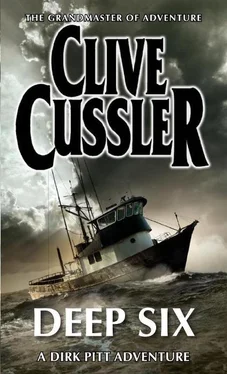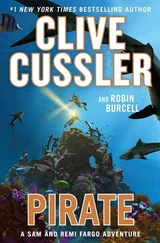Suddenly the battalion of news correspondents came alive as someone shouted, “Here he comes!”
Fifty cameras went into action as the screen door swung open and the President stepped onto the porch. He was dressed in cowboy boots and a cotton shirt tucked into a pair of faded Levi’s. Vice President Margolin followed him over the threshold, a large Stetson hat pulled low over his forehead. They paused for a minute in conversation, the President gesturing animatedly while Margolin appeared to listen thoughtfully.
“Go tight on the Vice President,” Mayo ordered.
“Have him,” Mitchell responded.
The sun was climbing toward the middle of the sky and the heat waves were rising over the reddish earth. The President’s farm swept away in all directions, mostly fields of hay and alfalfa, with a few pastures for his small herd of breeding cattle. The crops were a vivid green in contrast to the barren areas, and watered by huge circular sprinkling systems. Except for a string of cottonwoods bordering an irrigation ditch, the land unfolded in flat solitude.
How could a man who had spent most of his life in such desolation drive himself to influence billions of people? Mayo wondered. The more he saw of the strange egomania of politicians the more he came to despise them. He turned and spat at a colony of red ants, missing their tunnel entrance by only a few inches. Then he cleared his throat and began describing the scene into the microphone.
Margolin turned and went back into the house. The President, acting as though the press corps were still back in Washington, hiked to the barn without turning in their direction. The exhaust of a diesel engine was soon heard and he reappeared seated on a green John Deere tractor, Model 2640, that was hooked to a hay mower. There was a canopy and the President sat out in the open, a small transistor radio clipped to his belt and earphones clamped to his head. The correspondents began yelling questions at him, but it was obvious he couldn’t hear them above the rap of the exhaust and music from the local FM station.
He wrapped a red handkerchief over the lower part of his face, bandit style, to keep from breathing dust and exhaust fumes. Then he let down the mower’s sliding blades and started cutting the field, driving back and forth in long rows, working away from the people crowding the fence.
After about twenty minutes the correspondents slowly packed away their equipment and returned to the air-conditioned comfort of their trailers and motor homes.
“That’s it,” announced Mitchell. “No more tape, unless you want me to reload.”
“Forget it.” Mayo wrapped the cord around the microphone and handed it to Montrose. “Let’s get out of this heat and see what we’ve got.”
They tramped into the cool of the motor home. Mitchell removed the cassette holding the three-quarter-inch videotape from the camera, inserted it into the playback recorder and rewound it. When he was ready to roll from the beginning, Mayo pulled up a chair and parked himself less than two feet from the monitor.
“What are we looking for?” asked Montrose.
Mayo’s concentration didn’t waver from the images moving before his screen. “Would you say that’s the Vice President?”
“Of course,” said Mitchell. “Who else could it be?”
“You’re taking what you see for granted. Look closer.”
Mitchell leaned in. “The cowboy hat is covering his eyes, but the mouth and chin match. The build fits too. Looks like him to me.”
“Anything odd about his mannerisms?”
“The guy is standing there with his hands in his pockets,” said Montrose dumbly. “What are we supposed to read in that?”
“Nothing unusual about him at all?” Mayo persisted.
“Don’t notice a thing,” said Mitchell.
“All right, forget him,” said Mayo as Margolin turned and went back into the house. “Now look at the President.”
“If that ain’t him,” muttered Montrose acidly, “then he’s got an identical twin brother.”
Mayo brushed off the remark and sat quietly as the camera followed the President across the barnyard, revealing the slow, recognizable gait known to millions of television viewers. He disappeared into the dark of the barn, and two minutes later emerged on the tractor.
Mayo snapped erect. “Stop the tape!” he shouted.
Startled, Mitchell pressed a button on the recorder and the image froze.
“The hands!” Mayo said excitedly. “The hands on the steering wheel!”
“So he’s got ten fingers,” mumbled Mitchell, his expression sour. “So what?”
“The President wears only a wedding band. Look again. No ring on the middle finger of the left hand, but on the index finger you see a good-sized sparkler. And the pinkie on the right—”
“I see what you mean,” Montrose interrupted. “A flat blue stone in a silver setting, probably an amethyst.”
“Doesn’t the President usually sport a Timex watch with an Indian silver band inlaid with turquoise?” observed Mitchell, becoming swept along.
“I think you’re right,” Mayo recalled.
“The detail is fuzzy, but I’d say that’s one of those big Rolex chronometers on his wrist.”
Mayo pounded a fist on his knee. “That clinches it. The President is known never to buy or wear anything of foreign manufacture.”
“Hold on,” Montrose said slowly. “This is crazy. We’re talking about the President of the United States as if he wasn’t real.”
“Oh, he’s flesh and bone all right,” said Mayo, “but the body sitting on that tractor belongs to someone else.”
“If you’re right, you’ve got a live bomb in your hands,” said Montrose.
Mitchell’s enthusiasm began to dim. “We may be digging for clams in Kansas. Seems to me the evidence is damned shaky. You can’t go on the air, Curt, and claim some clown is impersonating the President unless you have documented proof.”
“Nobody knows that better than me,” Mayo admitted. “But I’m not about to let this story slip through my hands.”
“You’re launching a quiet investigation then?”
“I’d turn in my press card if I didn’t have the guts to see it through.” He looked at his watch. “If I leave now, I should be in Washington by noon.”
Montrose crouched in front of the TV screen. His face had the look of a child who found his tooth still in the glass of water the next morning. “It makes you wonder,” he said in a hurt tone, “how many times one of our Presidents used a double to fool the public.”
Vladimir Polevoi glanced up from his desk as his chief deputy and number-two man of the world’s largest intelligence-gathering organization, Sergei Ira-nov, walked purposefully into the room. “You look as if you’ve got a hot stake up your ass this morning, Sergei.”
“He’s escaped,” Iranov said tersely.
“Who are you talking about?”
“Paul Suvorov. He’s managed to break out of Bougainville’s hidden laboratory.”
Sudden anger flushed Polevoi’s face. “Damn, not now!”
“He called our New York covert action center from a public telephone in Charleston, South Carolina, and asked for instructions.”
Polevoi rose and furiously paced the carpet. “Why didn’t he call the FBI and ask them for instructions too? Better yet, he could have taken out an advertisement in USA Today.”
“Fortunately his superior immediately sent a coded message to us reporting the incident.”
“At least someone is thinking.”
“There’s more,” said Iranov. “Suvorov took Senator Larimer and Congressman Moran with him.”
Polevoi halted and spun around. “The idiot! He’s queered everything!”
“He is not entirely to blame.”
Читать дальше












